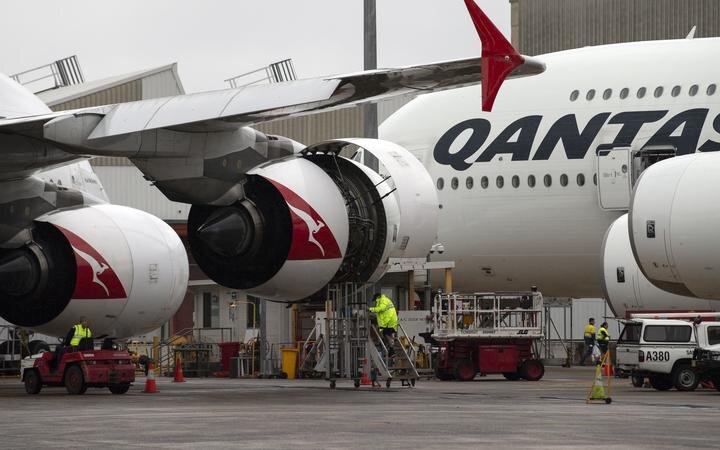Qantas no outlier in outsourcing push
Qantas’ decision to outsource ground staff was in life other full-service carriers, according to an industry expert, although its primary rival, Virgin Australia, will continue to employ its own staff.
Qantas reckons it can save $100 million a year in staffing costs, and another $80 million that it would need to upgrade equipment over the next five years by outsourcing ground handling. Paul Rovere
Singapore Airlines has used outside ground handlers — which do baggage handling, cabin cleaning, catering and refueling duties — since it divested from Singapore Airport Terminal Services in September 2009.
The company still offloads bags and refuels planes for Singapore Airlines at its Changi Airport home base.
Air New Zealand refused to answer questions and Cathay Pacific did not respond to questions about whether their ground-handling operation was in-house.
Chairman of travel sector research house CAPA — Centre for Aviation, Peter Harbison, said outsourcing this work was widespread.
“The bottom line is that many airlines prefer to do it,” he said. “An emerging problem though is that, due to the coronavirus and reduce income for many operators, the number of potential outsourcers has reduced, so there is a bit of transformation going in.”
Nevertheless, Qantas’ move will come under scrutiny in the Federal Court next wee as the Transport Workers’ Union challenges it.
The trade union says the decision, which will cost 2500 jobs across 10 airports, unfairly targeted its members and breached the Fair Work Act. Justice Geoffrey Flick will hold the first case management hearing next Tuesday.
TWU national secretary Michael Kaine attacked the extension of taxpayer support for airlines given the job losses.
End to taxpayer support pushed out
“This is no strings attached corporate welfare at its worst. The federal government is opening the public purse to the likes of Qantas without ensuring that the taxpayer is getting a good deal,” he said on Monday.
The Domestic Aviation Network Support package — which underwrites services on otherwise unprofitable routes for the airlines — will no longer end on January 31 and will instead stretch to March 28, deputy Prime Minister Michael McCormack announced on Monday.
Qantas said in its results for the 2020 financial year that it had already received more than half-a-million dollars of support from the government to help it survive the COVID-19 pandemic, which has brought global travel to a standstill since the early parts of the year.
According to federal tender data, the government has provided for almost $310 million under the prior three tranches of aviation support to Qantas as of noon on Monday.
“Qantas has taken public financial support to keep flying… and at the same time is trashing the jobs of 2500 ground workers,” Mr. Kaine said.
Qantas said its outsourcing drive was entirely lawful and crucial for the airline to reduce its overheads by $1 billion before the 2023 financial year as it looked to recover from the pandemic.
The airline slide to a $2 billion loss last financial year and has already decided to cut 8500 jobs — almost a third of its pre-COVID-19 workforce.
The decision to outsource ground handlers will save Qantas $100 million a year in staffing costs and a further $80 million it would need to upgrade in-house equipment over the next five years.
Virgin Australia has said it will keep ground handlers in-house at Adelaide, Sydney, Brisbane, and Melbourne as it exists administration.
New chief executive Jayne Hrdlicka said last week the airline had done all the outsourcing that was required.
“Our first preference is always to keep people in our teams as opposed to outsourcing,” she said at an industry event, the same day her carrier announced it has poached top Qantas executive Paul Jones.

